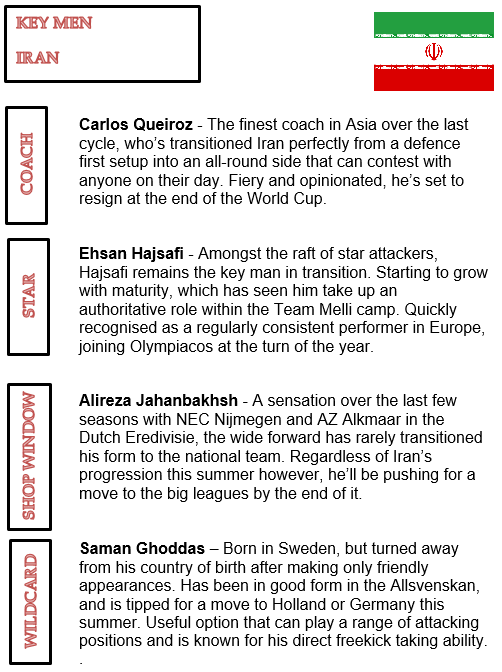Iran’s record in qualifying was nothing short of dominant. While their rivals regularly slipped up, Iran steamrolled through all in their wake. They went 18 matches unbeaten, keeping 12 clean sheets in a row, qualifying seven points clear of second placed South Korea.
The standard of play over the cycle has considerably increased. Iran’s portrayal in Brazil was rightly seen as a roadblock in front of their own goal, lacking any inventiveness going forward. Having to rely on the likes of Reza Ghoochannejhad (then struggling for game time at Charlton Athletic in the English second tier) and Karim Ansarifard (still plying his trade in Iran) to find the goals was always going to provide slim pickings. Ambitions were expectantly low, and despite only collecting one point from three matches, Iran headed home proud of their defensive resistance; peaking against Argentina, where they held out until a last minute piece of Lionel Messi magic broke the deadlock.
The credit for that defensive strength went to manager Carlos Queiroz, so much so that Asian football pundits have since regularly likened any masterclass of defensive ability, as a sign of the Portuguese coach style - a “Queiroz-esc" performance. The subsequent progression has to be credited likewise, and while Iran only scored 10 goals in as many games in the final stage of qualifying, Queiroz continued to get the best of his attacking players, no one more so than Sardar Azmoun, who since his breakthrough at the Asian Cup in 2015 has scored 22 in 29 appearances for Iran.
Queiroz will modestly point to a raft of attacking options that are simmering up nicely ahead of the World Cup. Alireza Jahanhabakhsh scored 21 goals and assisted a further 14 for AZ in the Eredivisie this last year, while the aforementioned Ghoochannejad (also in Holland) and Ansarifard (now at Olympiacos) have considerably ramped up their careers; scoring 27 over the last two seasons, and 17 in his first full European campaign respectively.
When Kaveh Rezaei’s name was cut from the provisional World Cup squad last month despite scoring 16 goals in his debut Belgian league season, you’d expect more to be made of it. But given the depth Queiroz has at his disposal it was always going to be difficult to trim down such a selection in attack.
Defensively the options aren’t exactly as plentiful. While Iran have excelled in this regard for the duration of Queiroz’s tenure, the reliance has usually been on sage, safety first centre backs over the next generation of Iranian talent.
That was until the last few weeks, as Queiroz made the surprising decision of leaving the immensely experienced Jalal Hosseini of Iranian champions Persepolis at home. While conspiracy theories ranged from a personal falling out to an on going war of words with Hosseini’s club boss Branko Ivanovic, the public stance has been to bring through new talent.
This opens up arguably the most interesting side plot to Iran’s upcoming World Cup campaign. While focus will be glued to a glut of in form attacking options, Queiroz’s juggling act in defence with a number of inexperienced and largely untested central options could make or break their campaign.
The options at his disposal aren’t what you’d call convincing. Assuming Pejman Montazeri, a journeyman of West Asian football who is steady if not spectacular, is a likely starter, the solution of who to partner him with is widely up for discussion.
Asian Cup hero Morteza Poulaganji is great on his day, but hasn’t hit those 2015 heights for a while due to injury. Rouzbeh Cheshmi is prone to making crucial errors despite his quite considerable talent, while Esteghlal teammate Majid Hosseini, still only 21 is probably considered too much of a risk after only picking up his first cap in the last month.
Their group isn’t exactly a forgiving testing ground for new talent either; Spain and reigning European champions Portugal await alongside Morocco in Group B, making their opening match against the North Africans a win or bust scenario where personnel tinkering isn’t exactly an ideal training opportunity. If any man can gel a new defensive unit though, Queiroz can. His influence and status within Iranian football remains at an all time high, making it more puzzling than ever that he’s revealed he’d be leaving at the end of the World Cup.
Far from it being a celebratory final tour, Queiroz in his typical fiery way took a swipe at an often amateurish Football Federation, who he’s on more than one occasion taken to action and threatened his resignation at the drop of a hat. The IFF have a poor track record of friendly and training camp organisation which has again dominated their run up to the World Cup, with public backing clearly remaining with the coach.
With Iran in such hot form, with a range of options to hand, Queiroz should be wary of believing his hype too early. The last year has been a cake walk, a squad that has been in truth focusing on the World Cup for a lot longer than any nation in Russia. Iran for once are a credible threat, a serious contender to provide an upset; that is if their coach doesn’t overthink it.



No comments:
Post a Comment